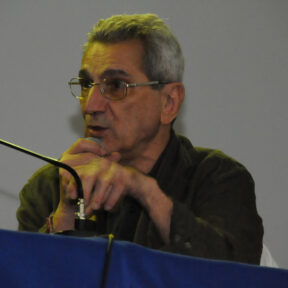
Antonio Negri
: Photo from Wikimedia Commons / Author of Photo: fabiogoveiaOverview
* Former organizer of Red Brigades terrorist group
* Co-author of the book Empire, a Marxist-postmodernist thesis arguing that, despite the fall of the Soviet Union, a worldwide communist revolution will still take place
Born on August 1, 1933, Antonio Negri was one of the organizers of the Red Brigades, the terrorist group responsible for several political assassinations in Italy, the most notorious of which was the 1979 kidnapping and murder of Italian prime minister Aldo Moro. At the time, Negri was a professor of political science at the University of Padua. He was arrested and charged with 17 murders, including that of Moro, as well as armed insurrection against the state. The Italian public was shocked that an academic could be involved in such events but most astonished by one bizarre detail. Forty-five days after the kidnapping, someone sounding like Negri telephoned Moro’s wife, taunting her about her husband’s impending death. Nine days later, Moro’s his body, with a gunshot in the head, was found dumped in a city lane.
Prosecutors argued that it was 80 per cent certain the the voice was Negri’s, but more cautious independent experts, perhaps mindful that some Red Brigade assassins were still at large, would only say that the call belonged to the “same class” of voices. The weekly newspaper L’Espresso created a public storm when it included, in its January 20, 1980 edition, a vinyl record containing the call to Moro’s wife along with a police-recorded sample of Negri’s voice. The paper invited readers: “You make the voice test.”
Awaiting trial in prison, Negri was elected to the Italian parliament on the ticket of the Marxist-led Radical Party. Claiming parliamentary immunity, he was temporarily released and used his freedom to escape to France. In absentia he was convicted and sentenced to 30 years in jail. By 1997 he had plea-bargained this down to a 13-year term as punishment for his membership in an armed band. He then returned to Italy to serve that sentence.
In 2000, Negri became an academic celebrity in the U.S. as co-author, with Duke University literary theorist Michael Hardt, of the book Empire, a Marxist-postmodernist thesis arguing that, despite the fall of the Soviet Union, a worldwide communist revolution is still a viable political agenda. Part of the book’s appeal on campus lay in the radical glamour of Negri’s terrorist past and the cover note biography recording him as an inmate of Rebibbia prison, Rome.
Negri was released from prison in the spring of 2003.
Negri was invited to speak at a May 4-6, 2005 conference hosted by the University of Sydney’s Research Institute for Humanities and Social Sciences and funded by its school of languages and culture. He was asked to speak on the topic: “Physiognomy of Origins: Multiplicities, Bodies and Radical Politics.”
- Much of this profile is adapted from the article “Tutorials in Terrorism,” written by Keith Windschuttle and published by The Weekend Australian on March 16, 2005.